NUR2225: Holistic Care Plan for Felix's PTSD in Acute Setting
VerifiedAdded on 2023/01/19
|11
|3261
|95
Essay
AI Summary
This essay presents a case study of Felix, a 20-year-old single man suffering from Post-Traumatic Stress Disorder (PTSD) stemming from childhood abuse. The essay identifies key management priorities for Felix's care in an acute mental health unit, including addressing suicidal thoughts, managing stress and anxiety, and tackling alcohol addiction. It proposes various psychological and pharmacological interventions, emphasizing holistic, patient-centered, and recovery-focused strategies. These interventions include psychological debriefing, coping skills therapy, cognitive processing therapy, and prolonged exposure therapy. The essay highlights the importance of addressing Felix's mental health issues both during his stay in the acute care unit and upon discharge to his home, aiming to improve his overall well-being and prevent relapse.
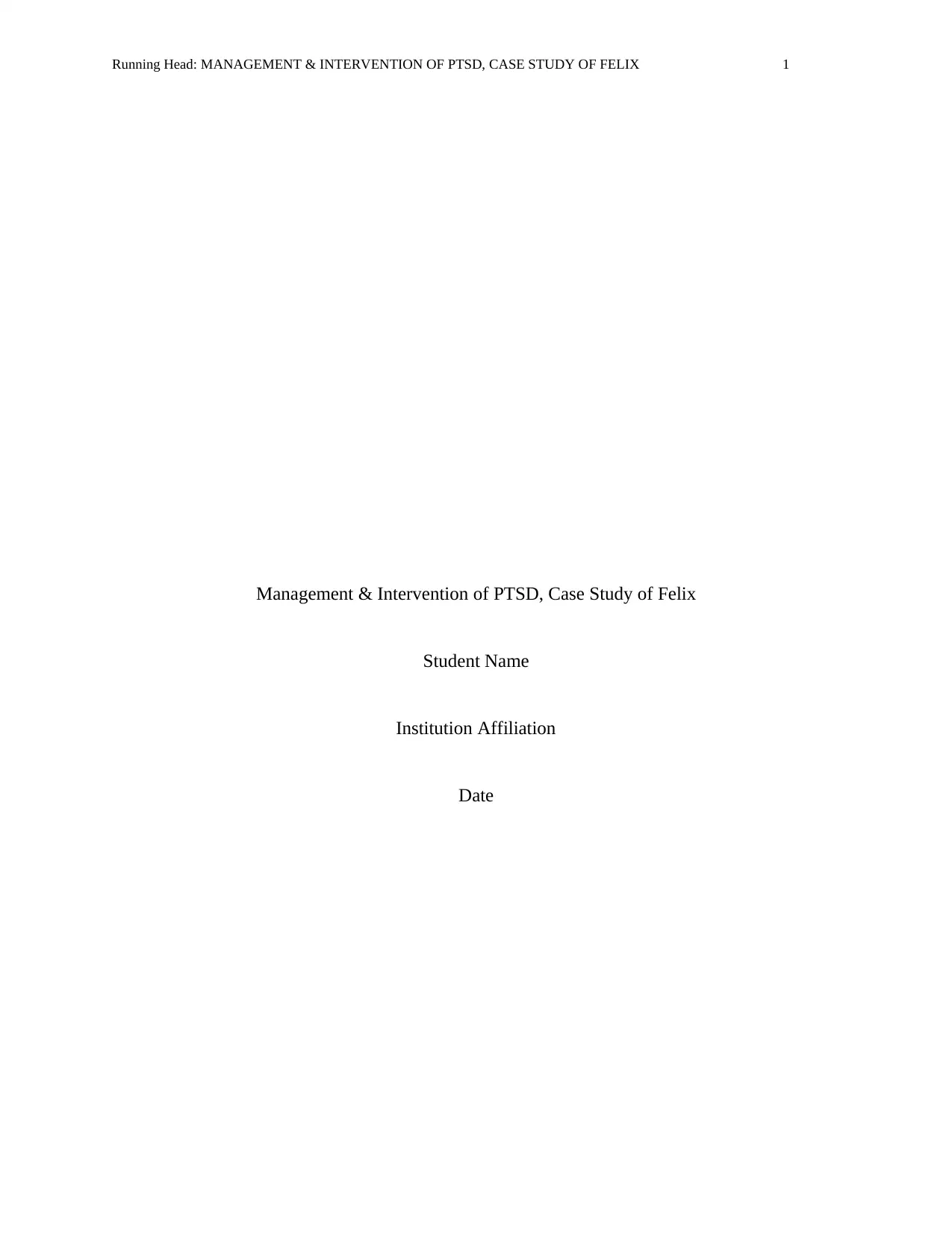
Running Head: MANAGEMENT & INTERVENTION OF PTSD, CASE STUDY OF FELIX 1
Management & Intervention of PTSD, Case Study of Felix
Student Name
Institution Affiliation
Date
Management & Intervention of PTSD, Case Study of Felix
Student Name
Institution Affiliation
Date
Paraphrase This Document
Need a fresh take? Get an instant paraphrase of this document with our AI Paraphraser

MANAGEMENT & INTERVENTION OF PTSD, CASE STUDY OF FELIX 2
Management & Intervention of PTSD, Case Study of Felix
Just like physical fitness which makes the body strong, mental fitness plays a key role in
promoting and sustaining a state of good mental health. A person who is mentally healthy enjoys
life and the environment around him as well as the people in it. With good mental health, people
become creative in learning, trying new things and taking risks. Also, a person with good mental
health can cope with difficult times in his personal life and professional life as well.
Good mental health does not prevent feelings of anger and sadness which come with the
loss of loved ones, jobs, broken relationships, and other difficult situations. However, despite
these situations, a person with good mental health is able to get on with and enjoy his life once
again. Nurturing mental health helps people to combat or prevent mental health problems that
can easily lead to chronic physical illnesses. In some instances, it prevents the onset of mental
illnesses. Mental health entails emotional, psychological and social well-being. It affects how
people feel, think and act. Good mental health determines how people handle stress, make
decisions and relate with others. Mainly, there are three factors which contribute to mental health
problems: biological factors such as genes, life experiences such as abuse and trauma and family
history of mental health problems. This paper scrutinizes the case of Felix who has mental health
problems and proposes ways of managing and intervening in her case.
The case study has presented Felix as a 20-year-old single man working as a marketer.
Felix has not had any past mental health history of medical history. However, it has been
revealed that Felix had experienced child abuse at the age of 10 before his parent’s marital
breakdown. After the breakdown, Felix was left under the custody of his mother who could not
afford to take care of him because of poor mental health. After school, Felix was left alone and
Management & Intervention of PTSD, Case Study of Felix
Just like physical fitness which makes the body strong, mental fitness plays a key role in
promoting and sustaining a state of good mental health. A person who is mentally healthy enjoys
life and the environment around him as well as the people in it. With good mental health, people
become creative in learning, trying new things and taking risks. Also, a person with good mental
health can cope with difficult times in his personal life and professional life as well.
Good mental health does not prevent feelings of anger and sadness which come with the
loss of loved ones, jobs, broken relationships, and other difficult situations. However, despite
these situations, a person with good mental health is able to get on with and enjoy his life once
again. Nurturing mental health helps people to combat or prevent mental health problems that
can easily lead to chronic physical illnesses. In some instances, it prevents the onset of mental
illnesses. Mental health entails emotional, psychological and social well-being. It affects how
people feel, think and act. Good mental health determines how people handle stress, make
decisions and relate with others. Mainly, there are three factors which contribute to mental health
problems: biological factors such as genes, life experiences such as abuse and trauma and family
history of mental health problems. This paper scrutinizes the case of Felix who has mental health
problems and proposes ways of managing and intervening in her case.
The case study has presented Felix as a 20-year-old single man working as a marketer.
Felix has not had any past mental health history of medical history. However, it has been
revealed that Felix had experienced child abuse at the age of 10 before his parent’s marital
breakdown. After the breakdown, Felix was left under the custody of his mother who could not
afford to take care of him because of poor mental health. After school, Felix was left alone and
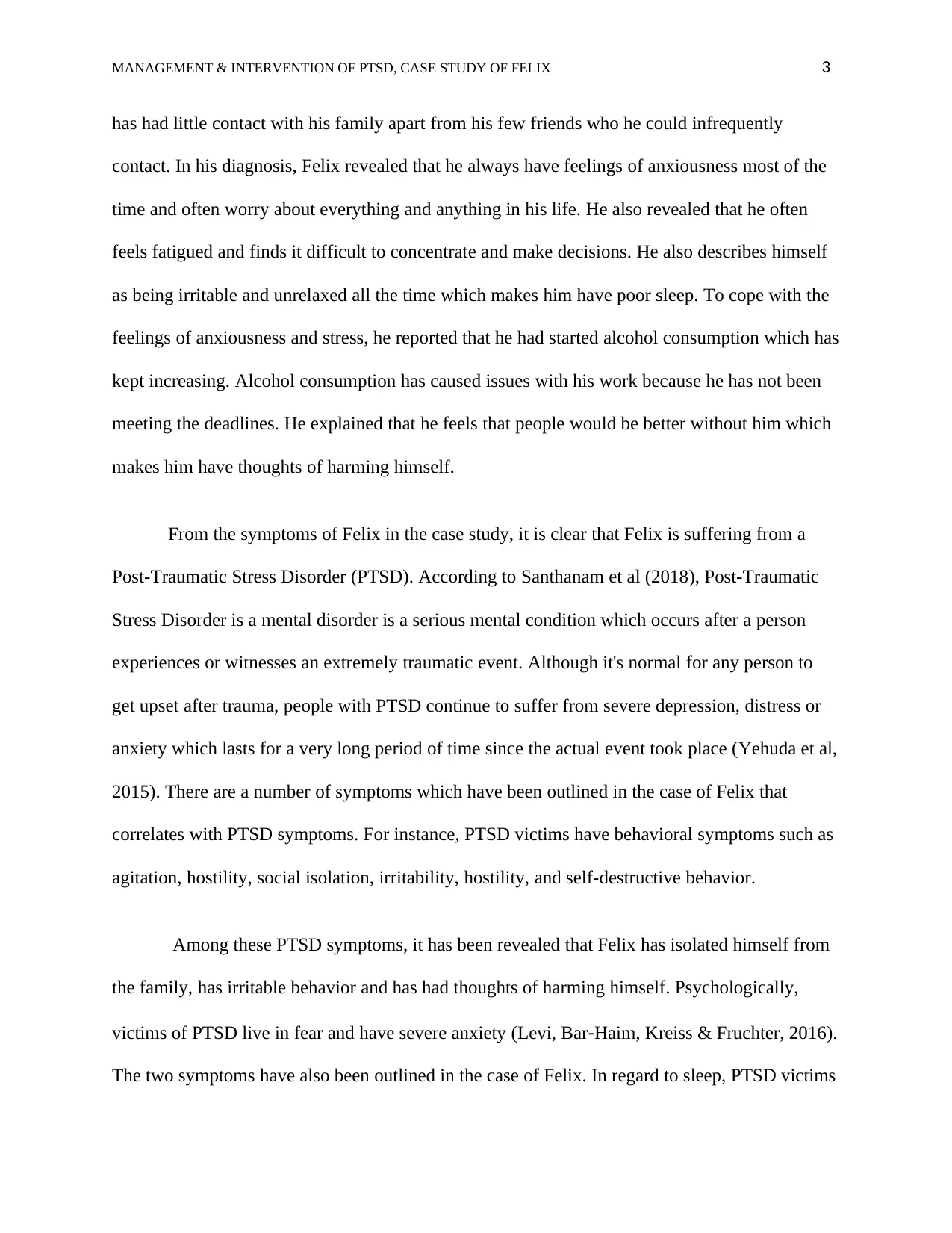
MANAGEMENT & INTERVENTION OF PTSD, CASE STUDY OF FELIX 3
has had little contact with his family apart from his few friends who he could infrequently
contact. In his diagnosis, Felix revealed that he always have feelings of anxiousness most of the
time and often worry about everything and anything in his life. He also revealed that he often
feels fatigued and finds it difficult to concentrate and make decisions. He also describes himself
as being irritable and unrelaxed all the time which makes him have poor sleep. To cope with the
feelings of anxiousness and stress, he reported that he had started alcohol consumption which has
kept increasing. Alcohol consumption has caused issues with his work because he has not been
meeting the deadlines. He explained that he feels that people would be better without him which
makes him have thoughts of harming himself.
From the symptoms of Felix in the case study, it is clear that Felix is suffering from a
Post-Traumatic Stress Disorder (PTSD). According to Santhanam et al (2018), Post-Traumatic
Stress Disorder is a mental disorder is a serious mental condition which occurs after a person
experiences or witnesses an extremely traumatic event. Although it's normal for any person to
get upset after trauma, people with PTSD continue to suffer from severe depression, distress or
anxiety which lasts for a very long period of time since the actual event took place (Yehuda et al,
2015). There are a number of symptoms which have been outlined in the case of Felix that
correlates with PTSD symptoms. For instance, PTSD victims have behavioral symptoms such as
agitation, hostility, social isolation, irritability, hostility, and self-destructive behavior.
Among these PTSD symptoms, it has been revealed that Felix has isolated himself from
the family, has irritable behavior and has had thoughts of harming himself. Psychologically,
victims of PTSD live in fear and have severe anxiety (Levi, Bar‐Haim, Kreiss & Fruchter, 2016).
The two symptoms have also been outlined in the case of Felix. In regard to sleep, PTSD victims
has had little contact with his family apart from his few friends who he could infrequently
contact. In his diagnosis, Felix revealed that he always have feelings of anxiousness most of the
time and often worry about everything and anything in his life. He also revealed that he often
feels fatigued and finds it difficult to concentrate and make decisions. He also describes himself
as being irritable and unrelaxed all the time which makes him have poor sleep. To cope with the
feelings of anxiousness and stress, he reported that he had started alcohol consumption which has
kept increasing. Alcohol consumption has caused issues with his work because he has not been
meeting the deadlines. He explained that he feels that people would be better without him which
makes him have thoughts of harming himself.
From the symptoms of Felix in the case study, it is clear that Felix is suffering from a
Post-Traumatic Stress Disorder (PTSD). According to Santhanam et al (2018), Post-Traumatic
Stress Disorder is a mental disorder is a serious mental condition which occurs after a person
experiences or witnesses an extremely traumatic event. Although it's normal for any person to
get upset after trauma, people with PTSD continue to suffer from severe depression, distress or
anxiety which lasts for a very long period of time since the actual event took place (Yehuda et al,
2015). There are a number of symptoms which have been outlined in the case of Felix that
correlates with PTSD symptoms. For instance, PTSD victims have behavioral symptoms such as
agitation, hostility, social isolation, irritability, hostility, and self-destructive behavior.
Among these PTSD symptoms, it has been revealed that Felix has isolated himself from
the family, has irritable behavior and has had thoughts of harming himself. Psychologically,
victims of PTSD live in fear and have severe anxiety (Levi, Bar‐Haim, Kreiss & Fruchter, 2016).
The two symptoms have also been outlined in the case of Felix. In regard to sleep, PTSD victims
⊘ This is a preview!⊘
Do you want full access?
Subscribe today to unlock all pages.

Trusted by 1+ million students worldwide
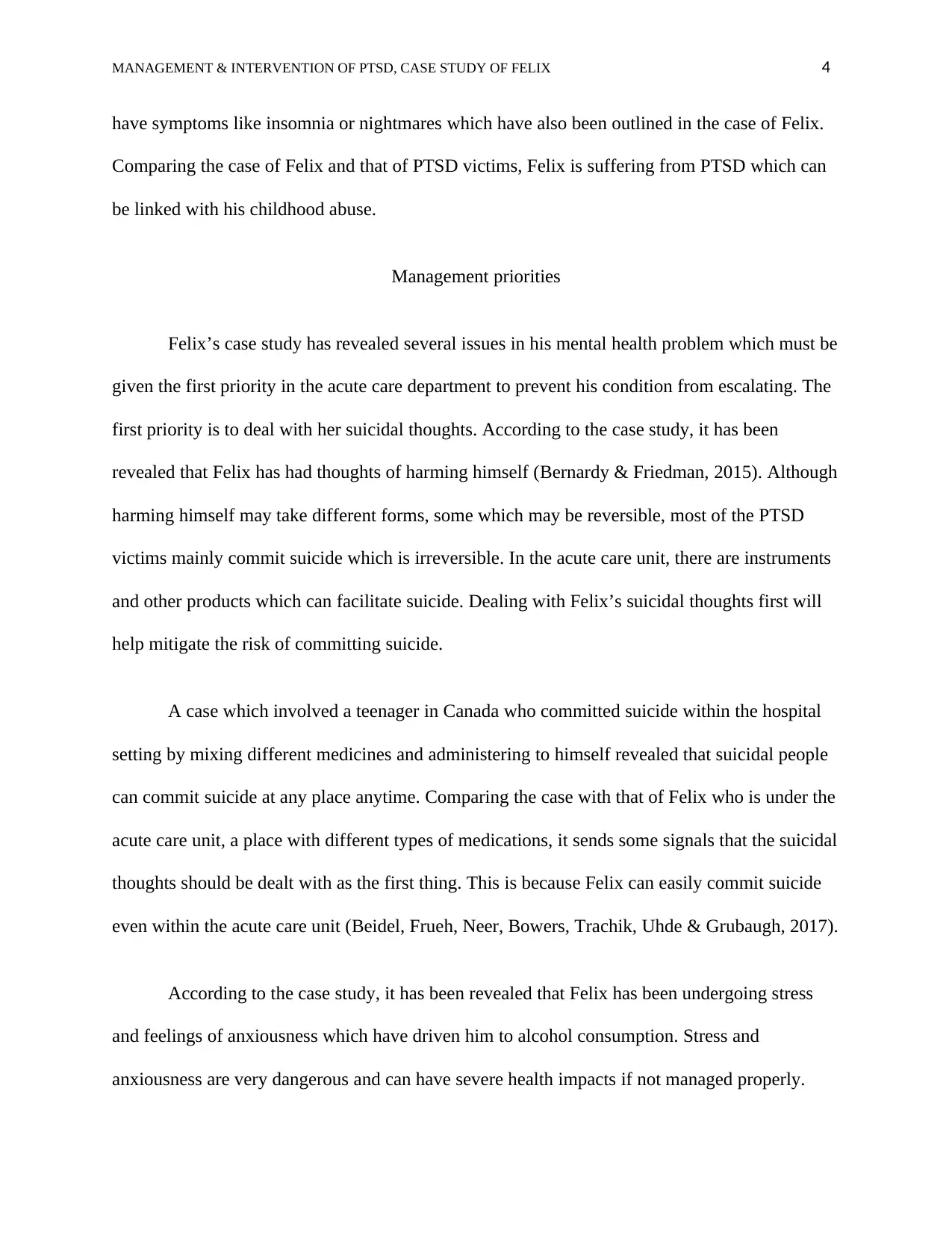
MANAGEMENT & INTERVENTION OF PTSD, CASE STUDY OF FELIX 4
have symptoms like insomnia or nightmares which have also been outlined in the case of Felix.
Comparing the case of Felix and that of PTSD victims, Felix is suffering from PTSD which can
be linked with his childhood abuse.
Management priorities
Felix’s case study has revealed several issues in his mental health problem which must be
given the first priority in the acute care department to prevent his condition from escalating. The
first priority is to deal with her suicidal thoughts. According to the case study, it has been
revealed that Felix has had thoughts of harming himself (Bernardy & Friedman, 2015). Although
harming himself may take different forms, some which may be reversible, most of the PTSD
victims mainly commit suicide which is irreversible. In the acute care unit, there are instruments
and other products which can facilitate suicide. Dealing with Felix’s suicidal thoughts first will
help mitigate the risk of committing suicide.
A case which involved a teenager in Canada who committed suicide within the hospital
setting by mixing different medicines and administering to himself revealed that suicidal people
can commit suicide at any place anytime. Comparing the case with that of Felix who is under the
acute care unit, a place with different types of medications, it sends some signals that the suicidal
thoughts should be dealt with as the first thing. This is because Felix can easily commit suicide
even within the acute care unit (Beidel, Frueh, Neer, Bowers, Trachik, Uhde & Grubaugh, 2017).
According to the case study, it has been revealed that Felix has been undergoing stress
and feelings of anxiousness which have driven him to alcohol consumption. Stress and
anxiousness are very dangerous and can have severe health impacts if not managed properly.
have symptoms like insomnia or nightmares which have also been outlined in the case of Felix.
Comparing the case of Felix and that of PTSD victims, Felix is suffering from PTSD which can
be linked with his childhood abuse.
Management priorities
Felix’s case study has revealed several issues in his mental health problem which must be
given the first priority in the acute care department to prevent his condition from escalating. The
first priority is to deal with her suicidal thoughts. According to the case study, it has been
revealed that Felix has had thoughts of harming himself (Bernardy & Friedman, 2015). Although
harming himself may take different forms, some which may be reversible, most of the PTSD
victims mainly commit suicide which is irreversible. In the acute care unit, there are instruments
and other products which can facilitate suicide. Dealing with Felix’s suicidal thoughts first will
help mitigate the risk of committing suicide.
A case which involved a teenager in Canada who committed suicide within the hospital
setting by mixing different medicines and administering to himself revealed that suicidal people
can commit suicide at any place anytime. Comparing the case with that of Felix who is under the
acute care unit, a place with different types of medications, it sends some signals that the suicidal
thoughts should be dealt with as the first thing. This is because Felix can easily commit suicide
even within the acute care unit (Beidel, Frueh, Neer, Bowers, Trachik, Uhde & Grubaugh, 2017).
According to the case study, it has been revealed that Felix has been undergoing stress
and feelings of anxiousness which have driven him to alcohol consumption. Stress and
anxiousness are very dangerous and can have severe health impacts if not managed properly.
Paraphrase This Document
Need a fresh take? Get an instant paraphrase of this document with our AI Paraphraser
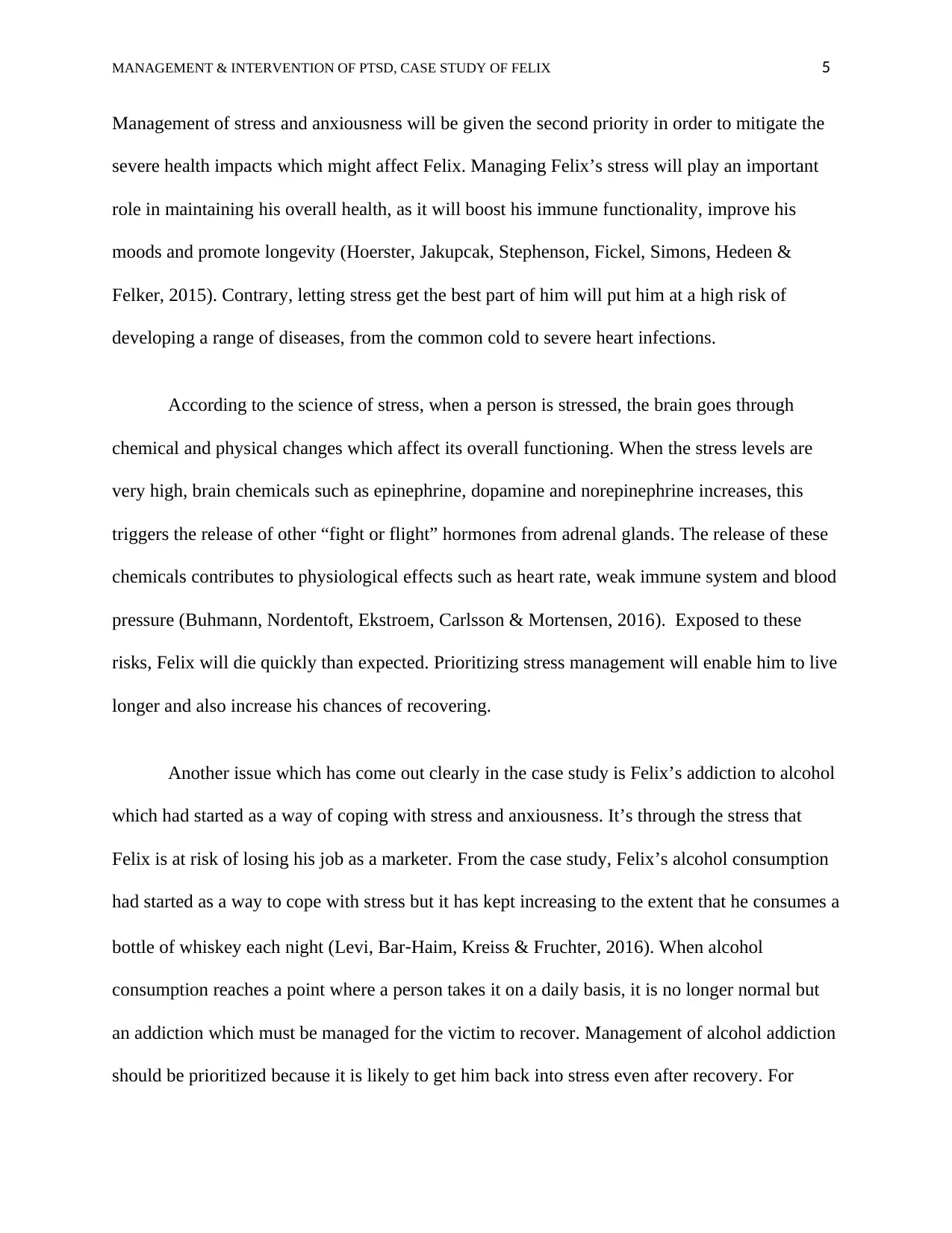
MANAGEMENT & INTERVENTION OF PTSD, CASE STUDY OF FELIX 5
Management of stress and anxiousness will be given the second priority in order to mitigate the
severe health impacts which might affect Felix. Managing Felix’s stress will play an important
role in maintaining his overall health, as it will boost his immune functionality, improve his
moods and promote longevity (Hoerster, Jakupcak, Stephenson, Fickel, Simons, Hedeen &
Felker, 2015). Contrary, letting stress get the best part of him will put him at a high risk of
developing a range of diseases, from the common cold to severe heart infections.
According to the science of stress, when a person is stressed, the brain goes through
chemical and physical changes which affect its overall functioning. When the stress levels are
very high, brain chemicals such as epinephrine, dopamine and norepinephrine increases, this
triggers the release of other “fight or flight” hormones from adrenal glands. The release of these
chemicals contributes to physiological effects such as heart rate, weak immune system and blood
pressure (Buhmann, Nordentoft, Ekstroem, Carlsson & Mortensen, 2016). Exposed to these
risks, Felix will die quickly than expected. Prioritizing stress management will enable him to live
longer and also increase his chances of recovering.
Another issue which has come out clearly in the case study is Felix’s addiction to alcohol
which had started as a way of coping with stress and anxiousness. It’s through the stress that
Felix is at risk of losing his job as a marketer. From the case study, Felix’s alcohol consumption
had started as a way to cope with stress but it has kept increasing to the extent that he consumes a
bottle of whiskey each night (Levi, Bar‐Haim, Kreiss & Fruchter, 2016). When alcohol
consumption reaches a point where a person takes it on a daily basis, it is no longer normal but
an addiction which must be managed for the victim to recover. Management of alcohol addiction
should be prioritized because it is likely to get him back into stress even after recovery. For
Management of stress and anxiousness will be given the second priority in order to mitigate the
severe health impacts which might affect Felix. Managing Felix’s stress will play an important
role in maintaining his overall health, as it will boost his immune functionality, improve his
moods and promote longevity (Hoerster, Jakupcak, Stephenson, Fickel, Simons, Hedeen &
Felker, 2015). Contrary, letting stress get the best part of him will put him at a high risk of
developing a range of diseases, from the common cold to severe heart infections.
According to the science of stress, when a person is stressed, the brain goes through
chemical and physical changes which affect its overall functioning. When the stress levels are
very high, brain chemicals such as epinephrine, dopamine and norepinephrine increases, this
triggers the release of other “fight or flight” hormones from adrenal glands. The release of these
chemicals contributes to physiological effects such as heart rate, weak immune system and blood
pressure (Buhmann, Nordentoft, Ekstroem, Carlsson & Mortensen, 2016). Exposed to these
risks, Felix will die quickly than expected. Prioritizing stress management will enable him to live
longer and also increase his chances of recovering.
Another issue which has come out clearly in the case study is Felix’s addiction to alcohol
which had started as a way of coping with stress and anxiousness. It’s through the stress that
Felix is at risk of losing his job as a marketer. From the case study, Felix’s alcohol consumption
had started as a way to cope with stress but it has kept increasing to the extent that he consumes a
bottle of whiskey each night (Levi, Bar‐Haim, Kreiss & Fruchter, 2016). When alcohol
consumption reaches a point where a person takes it on a daily basis, it is no longer normal but
an addiction which must be managed for the victim to recover. Management of alcohol addiction
should be prioritized because it is likely to get him back into stress even after recovery. For
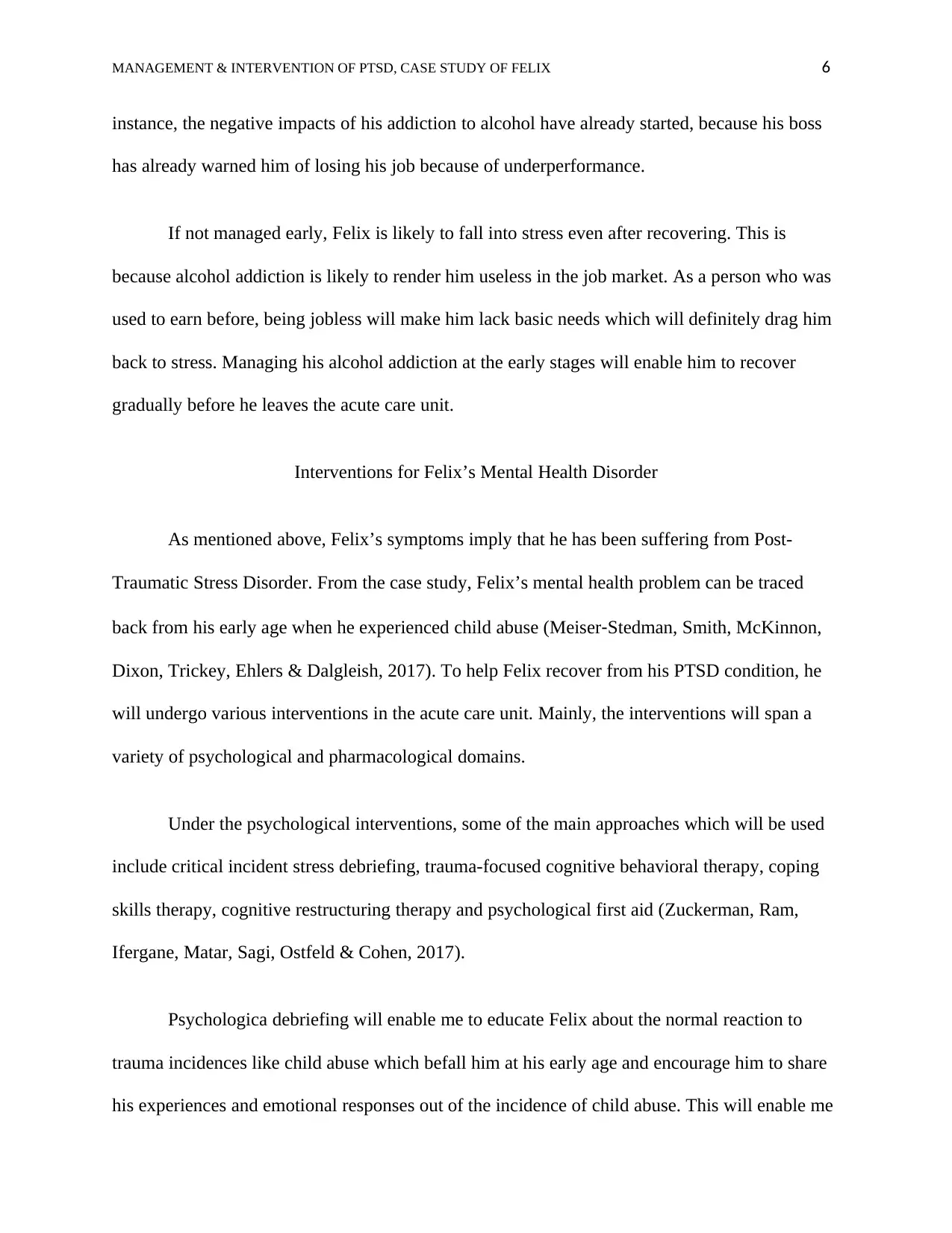
MANAGEMENT & INTERVENTION OF PTSD, CASE STUDY OF FELIX 6
instance, the negative impacts of his addiction to alcohol have already started, because his boss
has already warned him of losing his job because of underperformance.
If not managed early, Felix is likely to fall into stress even after recovering. This is
because alcohol addiction is likely to render him useless in the job market. As a person who was
used to earn before, being jobless will make him lack basic needs which will definitely drag him
back to stress. Managing his alcohol addiction at the early stages will enable him to recover
gradually before he leaves the acute care unit.
Interventions for Felix’s Mental Health Disorder
As mentioned above, Felix’s symptoms imply that he has been suffering from Post-
Traumatic Stress Disorder. From the case study, Felix’s mental health problem can be traced
back from his early age when he experienced child abuse (Meiser‐Stedman, Smith, McKinnon,
Dixon, Trickey, Ehlers & Dalgleish, 2017). To help Felix recover from his PTSD condition, he
will undergo various interventions in the acute care unit. Mainly, the interventions will span a
variety of psychological and pharmacological domains.
Under the psychological interventions, some of the main approaches which will be used
include critical incident stress debriefing, trauma-focused cognitive behavioral therapy, coping
skills therapy, cognitive restructuring therapy and psychological first aid (Zuckerman, Ram,
Ifergane, Matar, Sagi, Ostfeld & Cohen, 2017).
Psychologica debriefing will enable me to educate Felix about the normal reaction to
trauma incidences like child abuse which befall him at his early age and encourage him to share
his experiences and emotional responses out of the incidence of child abuse. This will enable me
instance, the negative impacts of his addiction to alcohol have already started, because his boss
has already warned him of losing his job because of underperformance.
If not managed early, Felix is likely to fall into stress even after recovering. This is
because alcohol addiction is likely to render him useless in the job market. As a person who was
used to earn before, being jobless will make him lack basic needs which will definitely drag him
back to stress. Managing his alcohol addiction at the early stages will enable him to recover
gradually before he leaves the acute care unit.
Interventions for Felix’s Mental Health Disorder
As mentioned above, Felix’s symptoms imply that he has been suffering from Post-
Traumatic Stress Disorder. From the case study, Felix’s mental health problem can be traced
back from his early age when he experienced child abuse (Meiser‐Stedman, Smith, McKinnon,
Dixon, Trickey, Ehlers & Dalgleish, 2017). To help Felix recover from his PTSD condition, he
will undergo various interventions in the acute care unit. Mainly, the interventions will span a
variety of psychological and pharmacological domains.
Under the psychological interventions, some of the main approaches which will be used
include critical incident stress debriefing, trauma-focused cognitive behavioral therapy, coping
skills therapy, cognitive restructuring therapy and psychological first aid (Zuckerman, Ram,
Ifergane, Matar, Sagi, Ostfeld & Cohen, 2017).
Psychologica debriefing will enable me to educate Felix about the normal reaction to
trauma incidences like child abuse which befall him at his early age and encourage him to share
his experiences and emotional responses out of the incidence of child abuse. This will enable me
⊘ This is a preview!⊘
Do you want full access?
Subscribe today to unlock all pages.

Trusted by 1+ million students worldwide
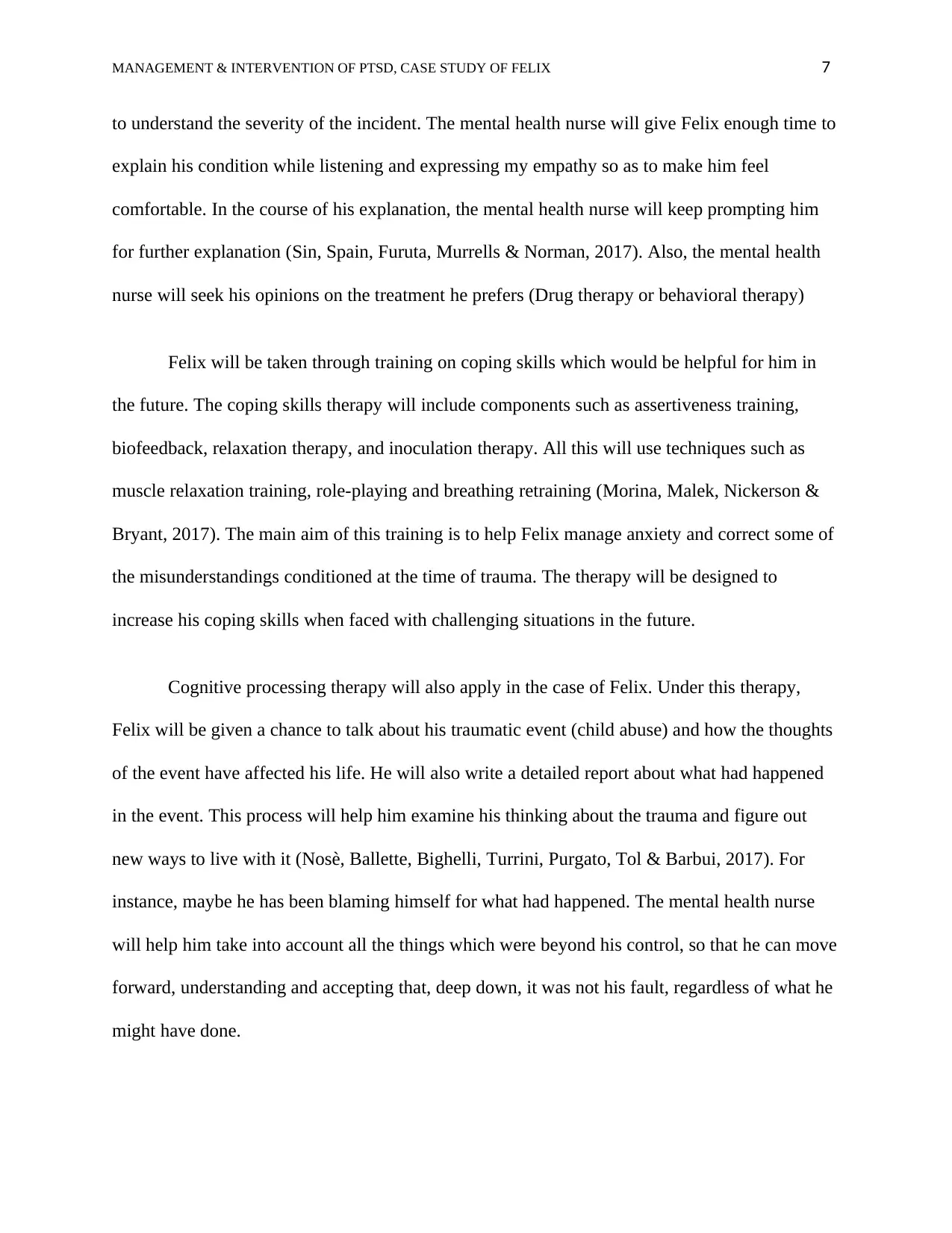
MANAGEMENT & INTERVENTION OF PTSD, CASE STUDY OF FELIX 7
to understand the severity of the incident. The mental health nurse will give Felix enough time to
explain his condition while listening and expressing my empathy so as to make him feel
comfortable. In the course of his explanation, the mental health nurse will keep prompting him
for further explanation (Sin, Spain, Furuta, Murrells & Norman, 2017). Also, the mental health
nurse will seek his opinions on the treatment he prefers (Drug therapy or behavioral therapy)
Felix will be taken through training on coping skills which would be helpful for him in
the future. The coping skills therapy will include components such as assertiveness training,
biofeedback, relaxation therapy, and inoculation therapy. All this will use techniques such as
muscle relaxation training, role-playing and breathing retraining (Morina, Malek, Nickerson &
Bryant, 2017). The main aim of this training is to help Felix manage anxiety and correct some of
the misunderstandings conditioned at the time of trauma. The therapy will be designed to
increase his coping skills when faced with challenging situations in the future.
Cognitive processing therapy will also apply in the case of Felix. Under this therapy,
Felix will be given a chance to talk about his traumatic event (child abuse) and how the thoughts
of the event have affected his life. He will also write a detailed report about what had happened
in the event. This process will help him examine his thinking about the trauma and figure out
new ways to live with it (Nosè, Ballette, Bighelli, Turrini, Purgato, Tol & Barbui, 2017). For
instance, maybe he has been blaming himself for what had happened. The mental health nurse
will help him take into account all the things which were beyond his control, so that he can move
forward, understanding and accepting that, deep down, it was not his fault, regardless of what he
might have done.
to understand the severity of the incident. The mental health nurse will give Felix enough time to
explain his condition while listening and expressing my empathy so as to make him feel
comfortable. In the course of his explanation, the mental health nurse will keep prompting him
for further explanation (Sin, Spain, Furuta, Murrells & Norman, 2017). Also, the mental health
nurse will seek his opinions on the treatment he prefers (Drug therapy or behavioral therapy)
Felix will be taken through training on coping skills which would be helpful for him in
the future. The coping skills therapy will include components such as assertiveness training,
biofeedback, relaxation therapy, and inoculation therapy. All this will use techniques such as
muscle relaxation training, role-playing and breathing retraining (Morina, Malek, Nickerson &
Bryant, 2017). The main aim of this training is to help Felix manage anxiety and correct some of
the misunderstandings conditioned at the time of trauma. The therapy will be designed to
increase his coping skills when faced with challenging situations in the future.
Cognitive processing therapy will also apply in the case of Felix. Under this therapy,
Felix will be given a chance to talk about his traumatic event (child abuse) and how the thoughts
of the event have affected his life. He will also write a detailed report about what had happened
in the event. This process will help him examine his thinking about the trauma and figure out
new ways to live with it (Nosè, Ballette, Bighelli, Turrini, Purgato, Tol & Barbui, 2017). For
instance, maybe he has been blaming himself for what had happened. The mental health nurse
will help him take into account all the things which were beyond his control, so that he can move
forward, understanding and accepting that, deep down, it was not his fault, regardless of what he
might have done.
Paraphrase This Document
Need a fresh take? Get an instant paraphrase of this document with our AI Paraphraser
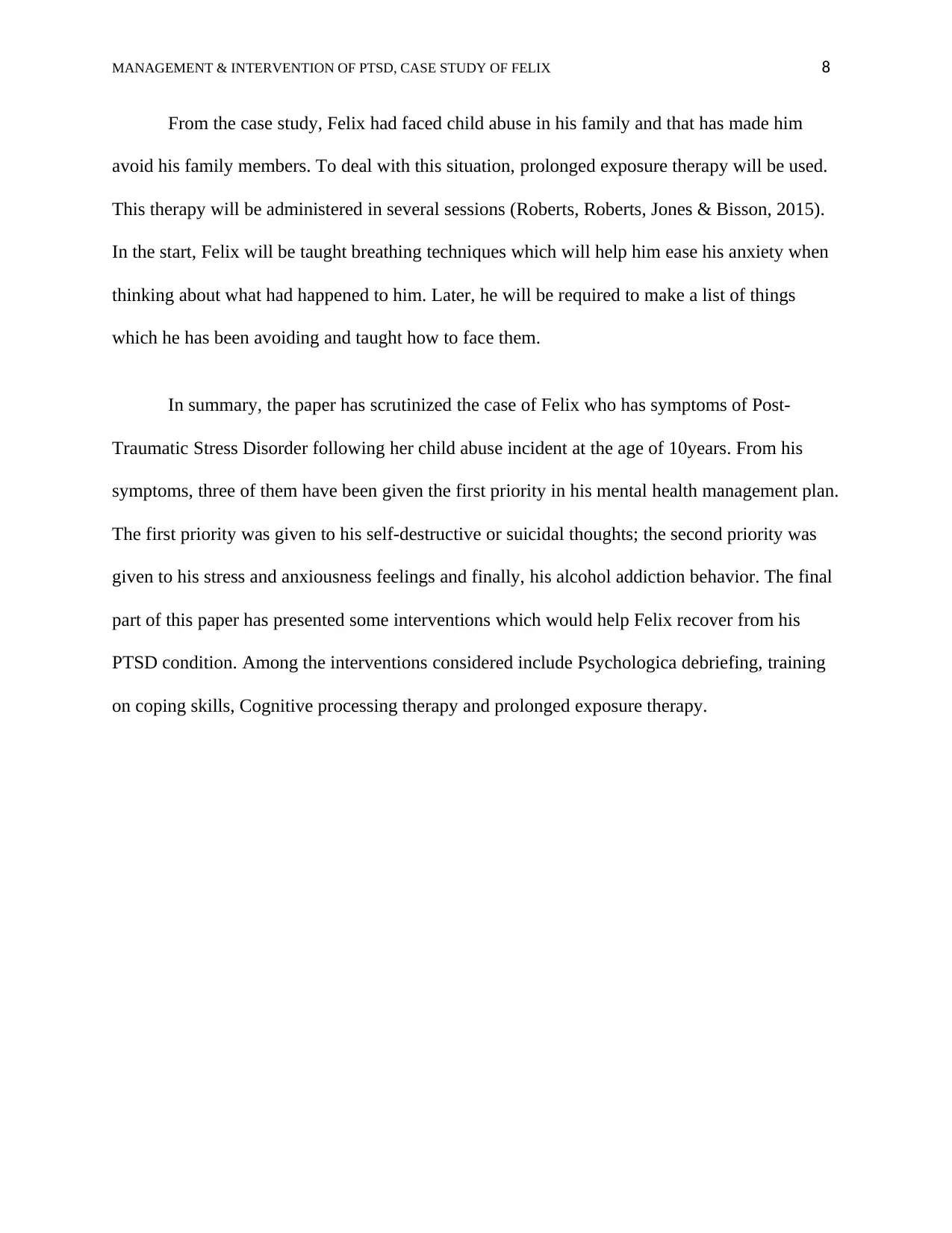
MANAGEMENT & INTERVENTION OF PTSD, CASE STUDY OF FELIX 8
From the case study, Felix had faced child abuse in his family and that has made him
avoid his family members. To deal with this situation, prolonged exposure therapy will be used.
This therapy will be administered in several sessions (Roberts, Roberts, Jones & Bisson, 2015).
In the start, Felix will be taught breathing techniques which will help him ease his anxiety when
thinking about what had happened to him. Later, he will be required to make a list of things
which he has been avoiding and taught how to face them.
In summary, the paper has scrutinized the case of Felix who has symptoms of Post-
Traumatic Stress Disorder following her child abuse incident at the age of 10years. From his
symptoms, three of them have been given the first priority in his mental health management plan.
The first priority was given to his self-destructive or suicidal thoughts; the second priority was
given to his stress and anxiousness feelings and finally, his alcohol addiction behavior. The final
part of this paper has presented some interventions which would help Felix recover from his
PTSD condition. Among the interventions considered include Psychologica debriefing, training
on coping skills, Cognitive processing therapy and prolonged exposure therapy.
From the case study, Felix had faced child abuse in his family and that has made him
avoid his family members. To deal with this situation, prolonged exposure therapy will be used.
This therapy will be administered in several sessions (Roberts, Roberts, Jones & Bisson, 2015).
In the start, Felix will be taught breathing techniques which will help him ease his anxiety when
thinking about what had happened to him. Later, he will be required to make a list of things
which he has been avoiding and taught how to face them.
In summary, the paper has scrutinized the case of Felix who has symptoms of Post-
Traumatic Stress Disorder following her child abuse incident at the age of 10years. From his
symptoms, three of them have been given the first priority in his mental health management plan.
The first priority was given to his self-destructive or suicidal thoughts; the second priority was
given to his stress and anxiousness feelings and finally, his alcohol addiction behavior. The final
part of this paper has presented some interventions which would help Felix recover from his
PTSD condition. Among the interventions considered include Psychologica debriefing, training
on coping skills, Cognitive processing therapy and prolonged exposure therapy.

MANAGEMENT & INTERVENTION OF PTSD, CASE STUDY OF FELIX 9
References
Beidel, D. C., Frueh, B. C., Neer, S. M., Bowers, C. A., Trachik, B., Uhde, T. W., & Grubaugh,
A. (2017). Trauma management therapy with virtual-reality augmented exposure therapy
for combat-related PTSD: A randomized controlled trial. Journal of anxiety disorders.
Bernardy, N. C., & Friedman, M. J. (2015). Psychopharmacological strategies in the
management of posttraumatic stress disorder (PTSD): what have we learned?. Current
Psychiatry Reports, 17(4), 20.
Buhmann, C. B., Nordentoft, M., Ekstroem, M., Carlsson, J., & Mortensen, E. L. (2016). The
effect of flexible cognitive–behavioural therapy and medical treatment, including
antidepressants on post-traumatic stress disorder and depression in traumatised refugees:
pragmatic randomised controlled clinical trial. The British Journal of Psychiatry, 208(3),
252-259.
Hoerster, K. D., Jakupcak, M., Stephenson, K. R., Fickel, J. J., Simons, C. E., Hedeen, A., ... &
Felker, B. L. (2015). A pilot trial of telephone-based collaborative care management for
PTSD among Iraq/Afghanistan war veterans. Telemedicine and e-Health, 21(1), 42-47.
Levi, O., Bar‐Haim, Y., Kreiss, Y., & Fruchter, E. (2016). Cognitive–behavioural therapy and
psychodynamic psychotherapy in the treatment of combat‐related post‐traumatic stress
disorder: A comparative effectiveness study. Clinical psychology &
psychotherapy, 23(4), 298-307.
References
Beidel, D. C., Frueh, B. C., Neer, S. M., Bowers, C. A., Trachik, B., Uhde, T. W., & Grubaugh,
A. (2017). Trauma management therapy with virtual-reality augmented exposure therapy
for combat-related PTSD: A randomized controlled trial. Journal of anxiety disorders.
Bernardy, N. C., & Friedman, M. J. (2015). Psychopharmacological strategies in the
management of posttraumatic stress disorder (PTSD): what have we learned?. Current
Psychiatry Reports, 17(4), 20.
Buhmann, C. B., Nordentoft, M., Ekstroem, M., Carlsson, J., & Mortensen, E. L. (2016). The
effect of flexible cognitive–behavioural therapy and medical treatment, including
antidepressants on post-traumatic stress disorder and depression in traumatised refugees:
pragmatic randomised controlled clinical trial. The British Journal of Psychiatry, 208(3),
252-259.
Hoerster, K. D., Jakupcak, M., Stephenson, K. R., Fickel, J. J., Simons, C. E., Hedeen, A., ... &
Felker, B. L. (2015). A pilot trial of telephone-based collaborative care management for
PTSD among Iraq/Afghanistan war veterans. Telemedicine and e-Health, 21(1), 42-47.
Levi, O., Bar‐Haim, Y., Kreiss, Y., & Fruchter, E. (2016). Cognitive–behavioural therapy and
psychodynamic psychotherapy in the treatment of combat‐related post‐traumatic stress
disorder: A comparative effectiveness study. Clinical psychology &
psychotherapy, 23(4), 298-307.
⊘ This is a preview!⊘
Do you want full access?
Subscribe today to unlock all pages.

Trusted by 1+ million students worldwide
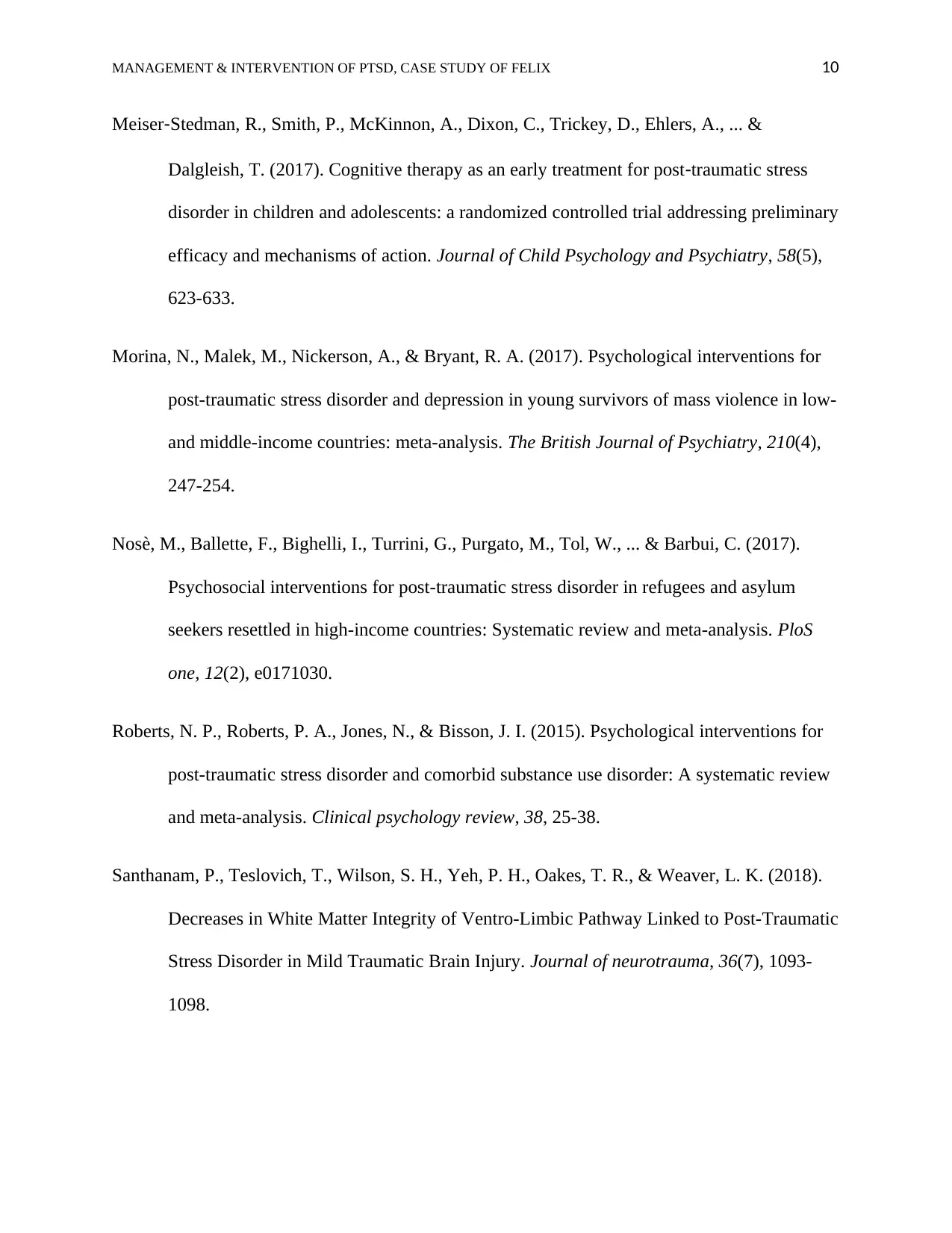
MANAGEMENT & INTERVENTION OF PTSD, CASE STUDY OF FELIX 10
Meiser‐Stedman, R., Smith, P., McKinnon, A., Dixon, C., Trickey, D., Ehlers, A., ... &
Dalgleish, T. (2017). Cognitive therapy as an early treatment for post‐traumatic stress
disorder in children and adolescents: a randomized controlled trial addressing preliminary
efficacy and mechanisms of action. Journal of Child Psychology and Psychiatry, 58(5),
623-633.
Morina, N., Malek, M., Nickerson, A., & Bryant, R. A. (2017). Psychological interventions for
post-traumatic stress disorder and depression in young survivors of mass violence in low-
and middle-income countries: meta-analysis. The British Journal of Psychiatry, 210(4),
247-254.
Nosè, M., Ballette, F., Bighelli, I., Turrini, G., Purgato, M., Tol, W., ... & Barbui, C. (2017).
Psychosocial interventions for post-traumatic stress disorder in refugees and asylum
seekers resettled in high-income countries: Systematic review and meta-analysis. PloS
one, 12(2), e0171030.
Roberts, N. P., Roberts, P. A., Jones, N., & Bisson, J. I. (2015). Psychological interventions for
post-traumatic stress disorder and comorbid substance use disorder: A systematic review
and meta-analysis. Clinical psychology review, 38, 25-38.
Santhanam, P., Teslovich, T., Wilson, S. H., Yeh, P. H., Oakes, T. R., & Weaver, L. K. (2018).
Decreases in White Matter Integrity of Ventro-Limbic Pathway Linked to Post-Traumatic
Stress Disorder in Mild Traumatic Brain Injury. Journal of neurotrauma, 36(7), 1093-
1098.
Meiser‐Stedman, R., Smith, P., McKinnon, A., Dixon, C., Trickey, D., Ehlers, A., ... &
Dalgleish, T. (2017). Cognitive therapy as an early treatment for post‐traumatic stress
disorder in children and adolescents: a randomized controlled trial addressing preliminary
efficacy and mechanisms of action. Journal of Child Psychology and Psychiatry, 58(5),
623-633.
Morina, N., Malek, M., Nickerson, A., & Bryant, R. A. (2017). Psychological interventions for
post-traumatic stress disorder and depression in young survivors of mass violence in low-
and middle-income countries: meta-analysis. The British Journal of Psychiatry, 210(4),
247-254.
Nosè, M., Ballette, F., Bighelli, I., Turrini, G., Purgato, M., Tol, W., ... & Barbui, C. (2017).
Psychosocial interventions for post-traumatic stress disorder in refugees and asylum
seekers resettled in high-income countries: Systematic review and meta-analysis. PloS
one, 12(2), e0171030.
Roberts, N. P., Roberts, P. A., Jones, N., & Bisson, J. I. (2015). Psychological interventions for
post-traumatic stress disorder and comorbid substance use disorder: A systematic review
and meta-analysis. Clinical psychology review, 38, 25-38.
Santhanam, P., Teslovich, T., Wilson, S. H., Yeh, P. H., Oakes, T. R., & Weaver, L. K. (2018).
Decreases in White Matter Integrity of Ventro-Limbic Pathway Linked to Post-Traumatic
Stress Disorder in Mild Traumatic Brain Injury. Journal of neurotrauma, 36(7), 1093-
1098.
Paraphrase This Document
Need a fresh take? Get an instant paraphrase of this document with our AI Paraphraser
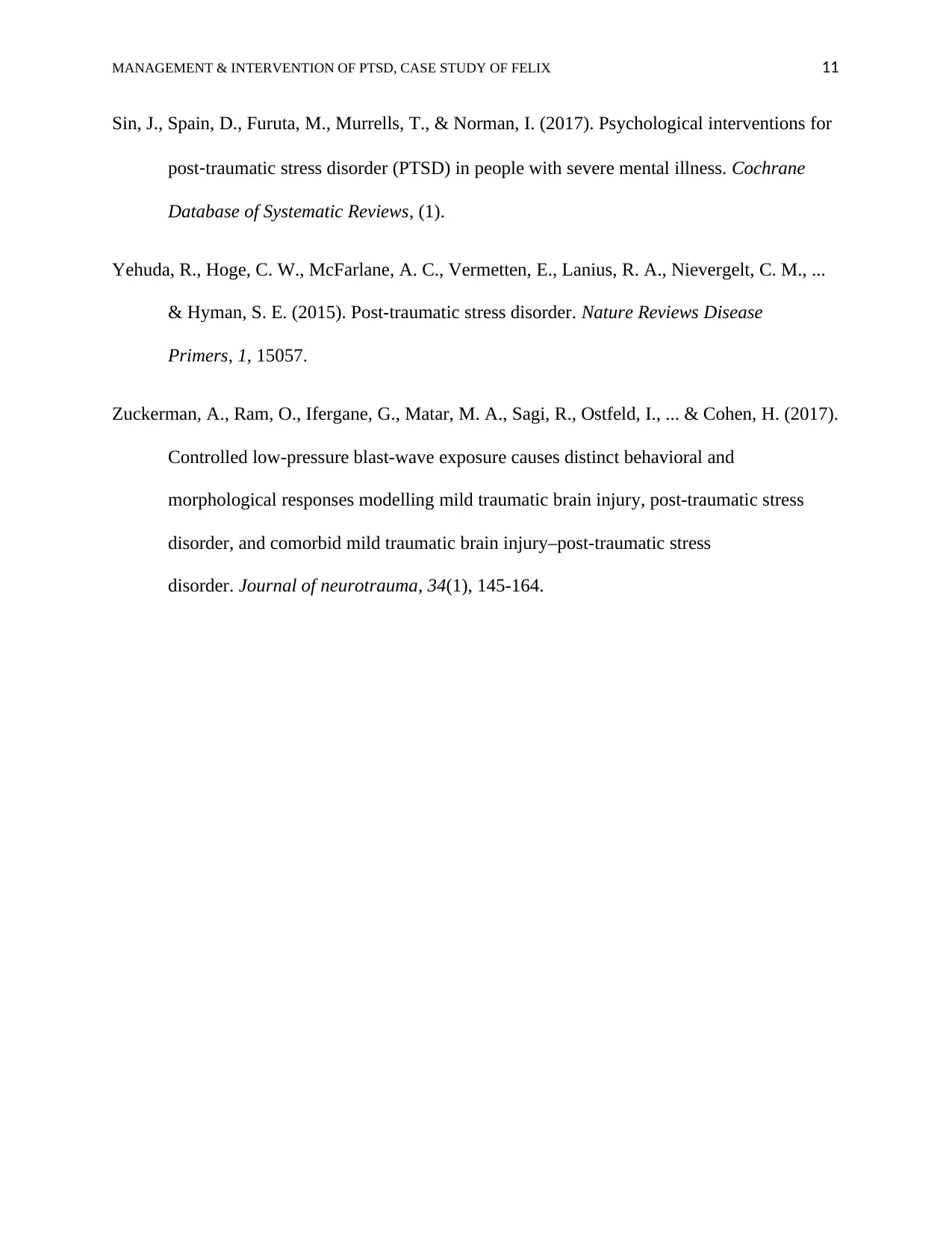
MANAGEMENT & INTERVENTION OF PTSD, CASE STUDY OF FELIX 11
Sin, J., Spain, D., Furuta, M., Murrells, T., & Norman, I. (2017). Psychological interventions for
post‐traumatic stress disorder (PTSD) in people with severe mental illness. Cochrane
Database of Systematic Reviews, (1).
Yehuda, R., Hoge, C. W., McFarlane, A. C., Vermetten, E., Lanius, R. A., Nievergelt, C. M., ...
& Hyman, S. E. (2015). Post-traumatic stress disorder. Nature Reviews Disease
Primers, 1, 15057.
Zuckerman, A., Ram, O., Ifergane, G., Matar, M. A., Sagi, R., Ostfeld, I., ... & Cohen, H. (2017).
Controlled low-pressure blast-wave exposure causes distinct behavioral and
morphological responses modelling mild traumatic brain injury, post-traumatic stress
disorder, and comorbid mild traumatic brain injury–post-traumatic stress
disorder. Journal of neurotrauma, 34(1), 145-164.
Sin, J., Spain, D., Furuta, M., Murrells, T., & Norman, I. (2017). Psychological interventions for
post‐traumatic stress disorder (PTSD) in people with severe mental illness. Cochrane
Database of Systematic Reviews, (1).
Yehuda, R., Hoge, C. W., McFarlane, A. C., Vermetten, E., Lanius, R. A., Nievergelt, C. M., ...
& Hyman, S. E. (2015). Post-traumatic stress disorder. Nature Reviews Disease
Primers, 1, 15057.
Zuckerman, A., Ram, O., Ifergane, G., Matar, M. A., Sagi, R., Ostfeld, I., ... & Cohen, H. (2017).
Controlled low-pressure blast-wave exposure causes distinct behavioral and
morphological responses modelling mild traumatic brain injury, post-traumatic stress
disorder, and comorbid mild traumatic brain injury–post-traumatic stress
disorder. Journal of neurotrauma, 34(1), 145-164.
1 out of 11
Related Documents
Your All-in-One AI-Powered Toolkit for Academic Success.
+13062052269
info@desklib.com
Available 24*7 on WhatsApp / Email
![[object Object]](/_next/static/media/star-bottom.7253800d.svg)
Unlock your academic potential
Copyright © 2020–2026 A2Z Services. All Rights Reserved. Developed and managed by ZUCOL.




